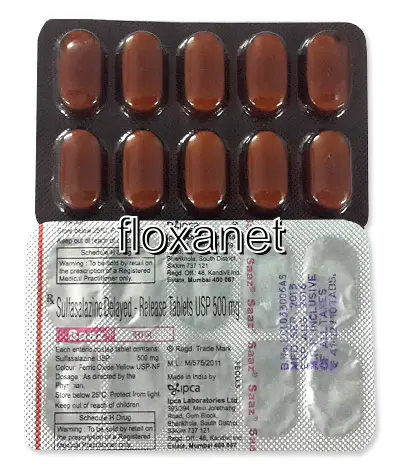Shop Sulfasalazine Online in the USA
| Package | Dosage | Price | Price per Dose | |
|---|---|---|---|---|
| Dosage: 500mg | ||||
| 360 pill | 500mg | $534.37 | $1.49 | |
| 270 pill | 500mg | $416.39 | $1.54 | |
| 180 pill | 500mg | $305.35 | $1.69 | |
| 120 pill | 500mg | $223.45 | $1.86 | |
| 90 pill | 500mg | $179.04 | $1.98 | |
| 60 pill | 500mg | $131.85 | $2.21 | |
| 30 pill | 500mg | $81.88 | $2.71 | |

Sulfasalazine Description
Overview of Sulfasalazine
Sulfasalazine is a medication commonly used to treat inflammatory conditions, particularly inflammatory bowel diseases such as ulcerative colitis and Crohn's disease. It belongs to a class of drugs known as aminosalicylates and works by reducing inflammation in the gastrointestinal tract. This medication is often prescribed when other treatments have not provided sufficient relief or are not suitable for the patient.
How Sulfasalazine Works
Sulfasalazine combines aspirin-like compounds with sulfonamides. Once ingested, it is broken down in the intestines into its active components—sulfapyridine and 5-aminosalicylic acid (5-ASA). These components help suppress the immune response and decrease inflammation, thereby alleviating symptoms such as abdominal pain, diarrhea, and rectal bleeding. Its targeted action within the GI tract makes it effective for managing chronic inflammatory diseases of this area.
Benefits and Effectiveness
Many patients find Sulfasalazine effective in controlling their symptoms and reducing flare-ups of inflammatory bowel disease. It can help induce and maintain remission, improve quality of life, and prevent tissue damage caused by ongoing inflammation. For some, it offers a relatively affordable and accessible treatment option, especially when other medications are contraindicated or less effective. Regular use, as prescribed by a healthcare professional, can lead to noticeable improvements in clinical symptoms over weeks to months.
Potential Side Effects and Precautions
Like any medication, Sulfasalazine can cause side effects. Common adverse reactions include nausea, headache, dizziness, and gastrointestinal discomfort. Some individuals may experience allergic reactions, such as rash or sensitivity to sunlight. A less common but more serious concern involves blood disorders, such as lowered white blood cell counts, which can increase infection risk. Regular blood tests are often recommended during treatment to monitor for these effects.
Considerations for Use
Patients should inform their healthcare provider about any allergies, existing health conditions, or other medications they are taking before starting Sulfasalazine. It is important to adhere precisely to dosage instructions to minimize side effects and maximize benefits. Additionally, some medications and supplements may interact with Sulfasalazine, so thorough medical guidance is essential.
Patient Reviews and Experience
Many users report significant symptom relief after starting Sulfasalazine therapy. They note a decrease in abdominal pain and fewer episodes of diarrhea, contributing to an improved daily life. However, some users mention experiencing mild side effects that often resolve with continued use or dose adjustments. Patience is sometimes necessary, as full benefits may take several weeks to become noticeable. It is crucial to stay in regular contact with healthcare providers to monitor progress and address any issues promptly.
Conclusion
Sulfasalazine remains a well-established medication in the management of inflammatory bowel diseases. Its ability to reduce inflammation and promote remission makes it a valuable treatment option. Despite potential side effects, many patients tolerate it well and appreciate its effectiveness. Proper medical supervision and adherence to prescribed guidelines are key to maximizing its benefits while minimizing risks.
See Also
